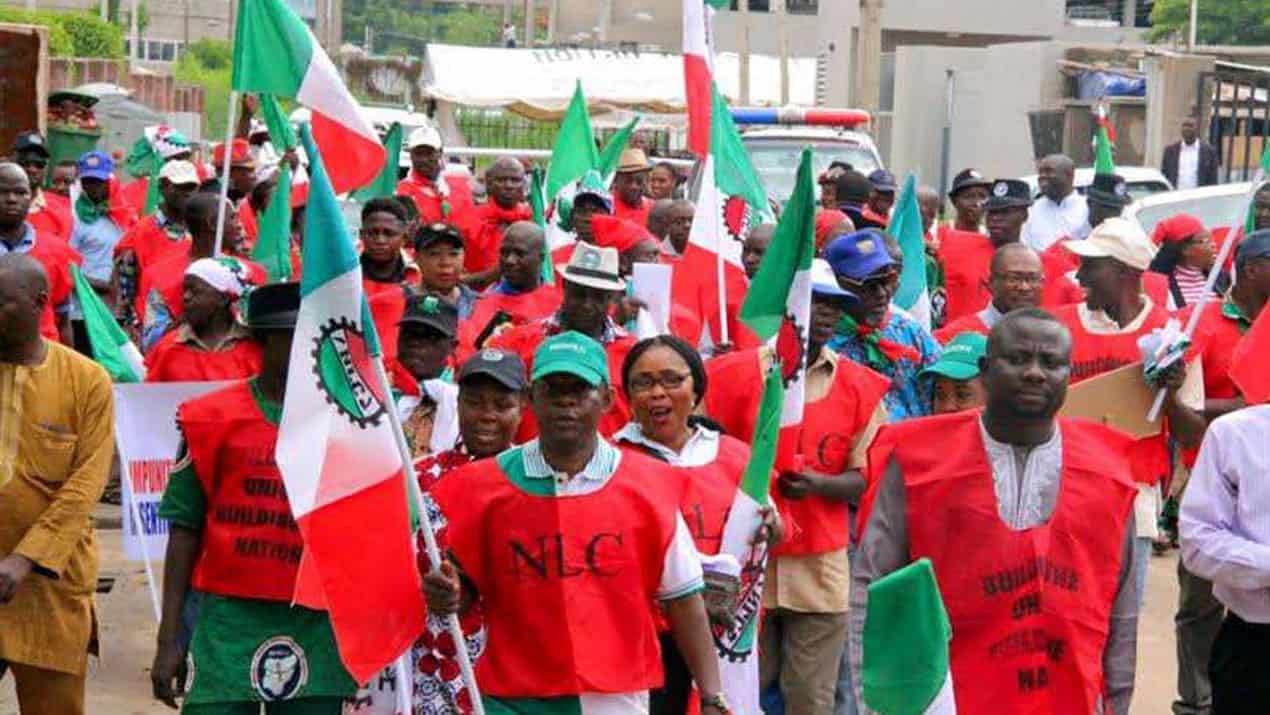On Tinubu’s agreement with labour
A mother-of-all-industrial action, planned by the two major labour unions, the Nigeria Labour Congress (NLC) and the Trade Union Congress (TUC), to impress on the government the severity of the suffering of the people due to the Tinubu administration’s policies, was aborted last week. The action, meant to be ‘total and indefinite,’ and billed to commence […]

FILE PHOTO: Labour Protests
A mother-of-all-industrial action, planned by the two major labour unions, the Nigeria Labour Congress (NLC) and the Trade Union Congress (TUC), to impress on the government the severity of the suffering of the people due to the Tinubu administration’s policies, was aborted last week. The action, meant to be ‘total and indefinite,’ and billed to commence on Tuesday, October 3, 2023, was called off on October 2, after the leaders of the two unions signed a Memorandum of Understanding with representatives of the federal government.
From the contents of the MoU, it is clear that the labour unions went to the negotiation table without a clear idea of what they wanted for the people or that the threat of an industrial action was a half-hearted and face-saving measure to deceive the Nigerian worker and the general public that they ‘fought’ government. The agreement signed by the NLC president, Joe Ajaero, and the TUC president, Festus Osifo, on the one side, and the Minister of Labour and Employment, Simon Lalong, and the Minister of Information and National Orientation, Mohammed Idris, on the side of the federal government, rarely contains any genuine commitment to address the people’s suffering.
The first item on the MoU was meant to address labour’s demand for a 200 per cent increase in salaries, as the economic measures taken by the government have devalued the naira and made nonsense of the wages and salaries paid to workers. However, labour came out of the negotiation room with a strange contraption called ‘a wage award’ of N35,000 to federal government workers, while a minimum wage committee was to be set up in November. From the MoU, even the ‘wage award’ may not be applicable to state and local government workers.
It is disturbing that five months into this administration that has pledged to pay ‘living wages’ to workers, no committee has been set up to design a new salary scale to make good on the plan. For the Tinubu government, the singular measure it could take to reassure Nigerians that it meant well when he increased the price of PMS and devalued the naira was to redistribute the excess foreign exchange gains through enhanced salaries and wages. However, it is clear that this government is reluctant to take this vital step by postponing the establishment of a minimum wage committee.
In the MoU, the government still raised the issue of Compressed Natural Gas (CNG) mass transit buses in the future tense, indicating that concrete steps have not been taken to make them available to reduce the cost of transportation. The agreement reads, “Federal Government accepts to vote N100 billion for the provision of high-capacity CNG buses for mass transit in Nigeria. Provisions are also being made for initial 55,000 CNG conversion kits to kick-start an auto-gas conversion programme…” Reading this item that lacks certainty without a date and concrete timeline is disturbing because the CNG project has been on the table since 2020 when the Buhari administration promised to implement the conversion programme. A serious government should have kicked off the programme immediately after the PMS price was hiked, considering the fact that there is already local capacity for the conversion of vehicles from PMS to being CNG-compliant.
Other items on the MoU, like the provision of subsidised fertilisers to farmers; funds for Micro, Small and Medium Scale Enterprises (MSMSE); a joint visitation to the refineries to ascertain their rehabilitation status; and the contentious outstanding salaries and wages of tertiary education workers, were addressed without genuine timelines.
The tone of the MoU does not demonstrate government’s or even labour’s appreciation of the serious pains government policies have inflicted on Nigerians. The people lack the purchasing power for essential goods that determine their survival. If this government means well, it should have put in place immediate measures to cushion the effects of the subsidy removal and the collapse of the foreign exchange rates, even without labour’s threat of an indefinite strike action. The government may have thought that Nigerians would adjust their lifestyles to the harsh conditions, but such magical thinking cannot translate to reality in a society where the currency has been scandalously devalued.
We call on the government to wake up to its responsibility and address the current hardship by taking concrete steps and not burying its head in the sand, expecting the wind to blow away the problem. Labour cannot afford to be complacent on this issue. It must show seriousness as Nigerians expect nothing less from it. So far, it has failed Nigerian workers. It must wake up. Also, the government must not celebrate a victory with the vague promises it handed to labour on October 2, 2023. Nigerians are waiting for genuine measures to clean up the chaos in the land.
